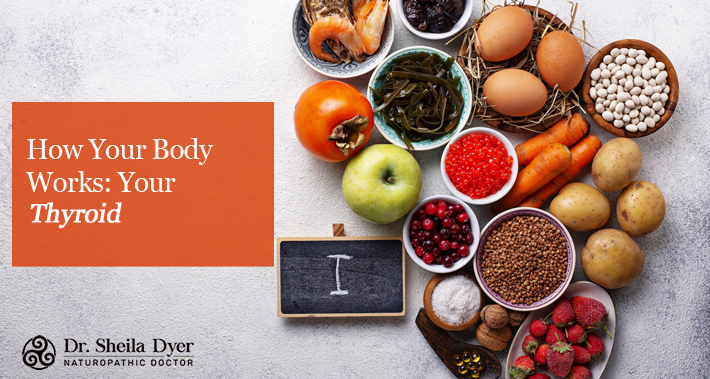What comes to mind when you think of your glands?
Probably your sweat glands – most of us are aware of these, especially during the hot summer months.
And of course there’s saliva glands, which help you eat and digest food.
These are examples of exocrine glands which excrete substances outside of the body.
You also have endocrine glands which release substances into the bloodstream, and the thyroid is one of the most important of these.
As an autoimmune thyroid conditions naturopathic doctor I want to help you understand what your thyroid gland does, and what happens when you have too much, or too little thyroid hormone in your system.
Let’s talk about your thyroid.
What Is Your Endocrine System?
The endocrine system consists of glands which produce and release hormones into the bloodstream.
It includes the following glands and organs:
- Testes or ovaries
- Hypothalamus
- Pituitary gland
- Pancreas
- Pineal gland
- Thyroid and parathyroid glands
- Adrenal glands
Your kidneys also have endocrine functions, but they aren’t strictly considered endocrine since they have other duties as well.
RELATED: Hormone Naturopathic Doctor Near Me
What Is Your Thyroid?
The thyroid is a butterfly shaped gland positioned at the front of the neck.
As a part of the endocrine system, its role is to secrete hormones.
These hormones act as chemical messengers for your body and affect metabolism, mood, reproduction, sexual function, growth, and more.
Primarily, the thyroid controls your metabolism.
What Hormones Does Your Thyroid Produce?
The two hormones produced by your thyroid are triiodothyronine (T3) and thyroxine (T4).
These are made when the body combines iodine with the amino acid tyrosine.
Both hormones can affect your:
- Heart
- Digestion
- Cognitive function
- Muscle control
- Bone health
- Metabolism
- Mood
- And more
RELATED: Digestive Health Naturopathic Doctor Near Me
Let’s look closer at what each of these hormones does.
Triiodothyronine (T3)
Triiodothyronine is created by the thyroid at lower levels than thyroxine.
We call it T3 for short.
However, it’s much more potent than its counterpart.
Thyroxine (T4)
Thyroxine is the main hormone produced by your thyroid.
However, it has a lesser effect on metabolism than its counterpart T3.
When released into the bloodstream, T4 can be converted to T3 if needed, through a process called deiodination.
What Are The Most Common Thyroid Diseases?
Thyroid diseases are generally either due to having too much thyroid hormone, or not enough of it.
Here are some of the more common illnesses that may affect your thyroid.
1. Hyperthyroidism
Hyperthyroidism is when your thyroid gland is overactive and produces excessive amounts of thyroid hormones.
At first, the symptoms associated with hyperthyroidism may appear in ways which some people see as positive such as excess energy and weight loss.
However, it can also lead to:
- Insomnia
- Low appetite
- Sweating more than is normal
- Breathing difficulties
- Increased anxiety
- Tachycardia
- Tremours of the hand
RELATED: Does Your Insomnia Have A Medical Cause?
2. Graves’ Disease
Graves’s disease is the leading cause of hyperthyroidism.
It’s an autoimmune condition, meaning it causes your immune system to attack healthy tissues.
In Graves’ disease, antibodies made by your immune system cause your thyroid to overproduce thyroid hormone.
Many of the symptoms of Graves’ disease are the same as hyperthyroidism.
However, it can also come with the following complications:
- Frequently teary eyes
- Red eyes
- Eyes protruding from their sockets
- Thick, patchy skin on your feet and lower legs
- Goiter, a visible lump or bulge which develops on the neck
The eye related symptoms are called Graves’ ophthalmopathy, or thyroid eye disease.
3. Hypothyroidism
Hypothyroidism occurs when your thyroid is unable to make enough thyroid hormone.
This is often due to treatments for other conditions which impair the thyroids’ ability to function (including treatment of hyperthyroidism), or inflammation of the thyroid gland.
People at higher risk for developing hypothyroidism include:
- People over 50 years of age
- Those which a family history of thyroid conditions or other autoimmune disorders
- People with other autoimmune disorders
- Women
- People who have had thyroid surgery
- Those with radiation exposure
- Those who are pregnant or have recently given birth
Symptoms of hypothyroidism include:
- Weight gain
- Tiredness and weakness
- Muscle aches and cramps
- Mood swings
- Poor memory
- Low libido
- Dry hair and skin
- Depressed mood
- Irregular menstrual cycle
4. Hashimoto’s Thyroiditis
Hashimoto’s thyroiditis is one of the most prevalent causes of hypothyroidism.
Also an autoimmune condition, it occurs when your immune system attacks the thyroid, leading to inflammation.
Symptoms of Hashimoto’s thyroiditis are generally similar to those of hypothyroidism, but can also cause goiter – swelling of the thyroid gland leading to an enlargement of the neck.
This can result in trouble swallowing and breathing.
5. Thyroid Cancer
Thyroid cancer happens when cells reproduce too quickly and a tumour occurs in your thyroid gland.
Often thyroid cancer does not present with any symptoms and is discovered during an examination for another purpose.
When symptoms do occur, they can include a swollen neck, trouble breathing, hoarse voice, and a chronic, persistent cough.
Can You Live Without A Thyroid?
Medical treatment for more serious thyroid conditions may involve a thyroidectomy, where they remove your thyroid.
So, yes, it’s possible to live without a thyroid.
But you can’t live without thyroid hormones.
So you’ll have to supplement them with hormone replacement therapy for the rest of your life.
How To Keep Your Thyroid Healthy
The foods you chose to eat can have a significant on your thyroid health.
In this section, we’ll look at some of the key nutrients that help keep this important gland functioning properly.
1. Get Enough Iodine
Iodine is a mineral which can be found in seafood, saltwater fish, and seaweed.
It’s also added to most table salt, which is where the name “iodized salt” comes from.
Due to its role in the creation of thyroid hormones, iodine is important for thyroid health.
Most people don’t have too much difficulty getting enough iodine due to the prevalence of added salt in many foods.
But if you’re eating a low salt diet – and that’s not a bad idea – make sure you’re getting enough iodine from other sources.
2. Get Enough Vitamin D
Low levels of vitamin D may contribute to Hashimoto’s disease and hypothyroidism.
In addition, for individuals who have an overactive thyroid and are prone to bone loss, too little vitamin D can be harmful.
Vitamin D can be found in milk and dairy products, eggs, mushrooms, and fatty fish.
It can also be produced by the body after exposure to sunlight.
3. Get Enough Selenium
Selenium is a mineral found in sunflower seeds, Brazil nuts, tuna, and crab.
It’s used in thyroid metabolism.
If you have low selenium levels, it can lead to hypothyroidism and Graves’ disease.
4. Get Enough Vitamin B12
Low levels of vitamin B12 are common in people with hypothyroidism.
This can lead to increased fatigue and irritability.
Get more vitamin B12 by incorporating nutritional yeast, liver, fortified cereal, and dairy products into your diet.
Book Your Appointment With Dr. Sheila Dyer, ND, Today
Are you experiencing issues which could be related to excess, or lack, of thyroid hormones?
Unexplained weight gain or loss?
Excessive sweating?
Anxiety?
Decreased sex drive?
These could all be side effects of a thyroid condition.
I’m Dr. Sheila Dyer, ND, a naturopathic doctor in Toronto who helps people with endocrine issues, and I can help.
We’ll determine the cause of your symptoms, and then together we’ll develop a treatment plan to help you manage your condition that works with your lifestyle.
Book an appointment with me today to start on the path to feeling well again.
If you have questions about naturopathic medicine, or would like to start with your first consultation, contact me, and let’s book an appointment.
Dr. Sheila Dyer, ND1080 Dovercourt Rd,
Toronto, ON M6H 2X8
(416) 554-5135
► https://g.page/DrSheilaDyerNd
Dr. Sheila Dyer is a Naturopathic Doctor and a practicing registered nurse offering holistic healthcare with a scientific focus

